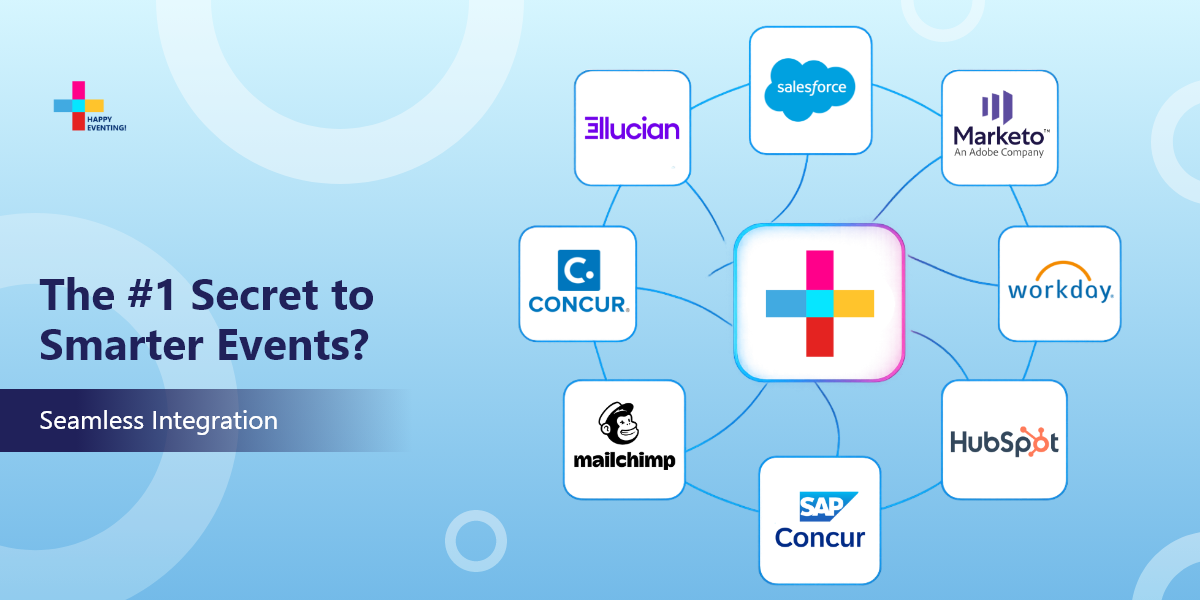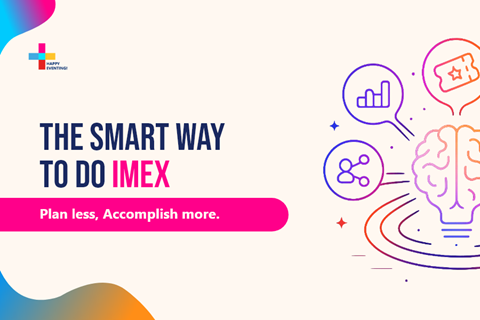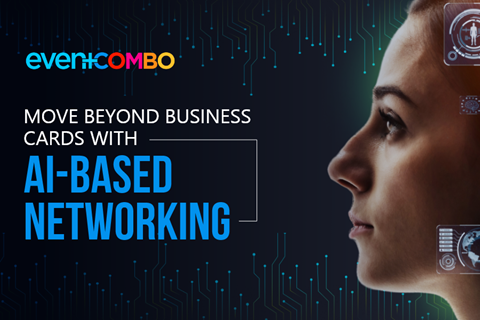

One problem we hear over and over again from planners is the frustration of juggling disconnected tools. A registration system that doesn't sync with the CRM. A budget tracker stuck in spreadsheets. A marketing platform that requires constant exports just to send a simple campaign. It's a setup that drains time, creates mistakes, and leaves the attendee experience feeling clunky.
Meanwhile, planners are already stretched thin. They're acting as strategists, producers, and creative leads all at once. Adding "data analyst" to that list is the breaking point.
This is where integrations change everything. When platforms connect—whether through native integrations or open APIs—all that manual work disappears. Instead of patching systems together, planners get one connected flow, less risk, and more headspace to handle the big things such as sponsors, speakers, and attendees without drowning in administrative work.
Most modern events run on a mix of 6–10 different systems — registration platforms, CRMs, mobile apps, email systems, budget trackers, survey tools, and more. Every gap between them forces planners to fill it manually. One missed export, one wrong upload, and the consequences show up fast. A VIP left off the guest list. A badge printed with the wrong name. A payment that doesn't reconcile until weeks later.
These aren't minor glitches. They're the kinds of mistakes that damage credibility and add stress to teams already running at full capacity. And integrations are what prevent these cracks from forming by keeping all systems in sync.
At their core, event software integrations are the connections that allow different tools to communicate automatically. Think of them as the wiring that transforms a collection of standalone systems into one connected engine. Without integration, your registration platform, CRM, and marketing tools all operate in their own silos. With integration they work as one.
When a new attendee registers, their information automatically syncs into your Salesforce or HubSpot account, adds them to the correct email sequence in Mailchimp, and updates your attendee dashboard in real time without anyone exporting a spreadsheet. It transforms your collection of individual tools into a single, cohesive powerhouse.
The impact of integrations extends well beyond convenience. Here is how they impact different stakeholders:
Moving from a fragmented set of tools to an integrated ecosystem brings tangible, strategic advantages that address the core challenges of event management. Understanding why event integrations matter is crucial: this shift drives efficiency, delivers deeper insights, and helps you create a superior event experience that sets you apart. The benefits of event software integration include a more organized and reliable process that saves time and reduces stress for event organizers.
Here are the specific benefits of event software integration a connected tech stack delivers.
The most immediate payoff is automation. The clearest win from event integrations is the time they give back. All the exporting, uploading, and cross-checking that usually eats hours turns into a background process that just runs.
In a disconnected system, your data is scattered, making it nearly impossible to get a clear, holistic view of your event's performance. Event integrations solve this by consolidating data from all your connected tools into a single, centralized platform.
The attendee experience often begins long before the event day, and a disconnected tech stack can create a clumsy and unprofessional first impression. Event software integrations ensure a smooth, consistent, and professional journey for every participant.
Effective event marketing relies on personalization and timeliness, both of which are difficult to achieve with disconnected data. By leveraging event integrations with marketing automation platforms like HubSpot or Marketo, you can supercharge your promotional efforts.
For small, one-off events, teams can sometimes brute force their way through manual processes. But when organizations run multiple events or try to grow their programs, that approach quickly breaks down. Integrations directly impact profitability by reducing staff hours, cutting error rates, and enabling faster sales cycles. Beyond efficiency, integrations make it possible to scale events without inflating headcount or sacrificing accuracy, turning programs into true ROI drivers.
Recognizing the need for event integration is the first step, but the real key is selecting an event management platform that can serve as a robust, central hub for your entire tech stack. The platform you choose will determine the power and flexibility of your event software integrations. Not all platforms are created equal in this regard, so it's crucial to evaluate their capabilities to ensure they can support your unique ecosystem. To help you make an informed decision, here is a checklist of what to look for when evaluating event platforms for their integration capabilities.
Does the platform offer a solid library of "plug-and-play" integrations for the tools you already rely on? A robust platform will seamlessly connect with key software across different categories, including:
These pre-built connectors are designed for easy setup and reliable performance, saving you significant development time and resources.
A well-documented and flexible Open API is essential for building custom event software integrations to proprietary systems or niche software. An Open API gives your development team the freedom to build tailored solutions that precisely match your workflows. The benefit is flexibility. No matter how strong the native library is, every organization has unique systems or niche tools. An open API ensures you can still connect to them.
Event integrations are only as good as their ability to handle your data volume. A platform must be able to manage thousands of API calls without slowing down, especially during peak registration periods. Ask potential vendors about their API limits and performance under load to ensure the system can scale with your events. The outcome is stability. As your events grow, your integrations must handle thousands of calls without slowing down or crashing during peak times.
When you connect systems through event software integrations, you are transferring sensitive attendee and financial data. It is absolutely critical that the platform adheres to modern security protocols and compliance standards, such as GDPR and SOC 2. Ensure the vendor has robust measures in place to protect your data both in transit and at rest.
The benefit is trust: integrations keep data constantly in motion—including sensitive attendee and financial information.
The goal of event integrations is a unified view of your data. The platform should centralize the data in a meaningful and accessible way. Look for a platform with a powerful dashboard that provides analytics and reporting from all your connected systems, giving you that essential single source of truth.
The outcome is clarity. Integrations should do more than connect — they should unify data in a way that makes it useful.
Setting up and managing event integrations can sometimes be complex. A good partner will provide clear, comprehensive documentation for their API and have a knowledgeable technical support team ready to assist you. Look for vendors who see themselves as partners in your success, not just software providers. The value here is peace of mind. Even with good documentation, integrations can be complex, and you don't want to be left figuring it out alone.
Events are no longer judged only by what happens on-site. For planners, it means less firefighting. For attendees, it creates a professional journey that builds trust. For executives, it shows the numbers that prove event value. The conversation has shifted: integrations aren't about convenience anymore, they're about competitiveness. The organizations that invest in connected event ecosystems will run faster, report smarter, and stand out in a crowded market. If staying competitive means building a connected event ecosystem, the right platform makes all the difference. Eventcombo gives you the integrations and expert support to connect your stack, prove ROI, and scale with confidence.
Book a demo today to see how integrated events can set your programs apart.

One problem we hear over and over again from planners is the frustration of juggling disconnected tools. A registration system that doesn't sync with the CRM. A budget tracker stuck in spreadsheets.

Planning your trip to Las Vegas for the event industry's biggest marketplace? This guide is your playbook for building a high-impact schedule, picking the right sessions, and structuring your appointments strategically.

Networking is one of the most valuable ways to discover boundless opportunities and for 77.7% of business professionals , in-person conferences open a greater scope to make rewarding connections.